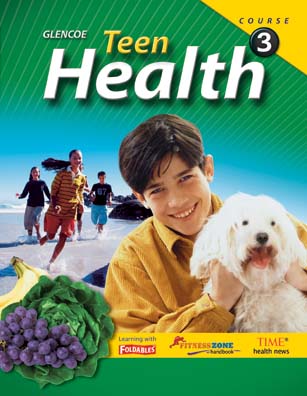Teen Health Course 3Chapter 3:
Mental and Emotional HealthStudent Web Activities - Teacher ContentLesson 1
Answers- Self-esteem is the way you think about yourself and what you expect of yourself.
- Some factors that can affect your self esteem are praise and criticism from parents, friendships at school and attitudes from teachers will continue to affect you from preschool through high school.
- You can change the way you feel about yourself — and the way other people perceive you — just by changing the way you think about yourself.
- You should set realistic goals you know you can achieve, such as exercising three times to five times a week and eating well.
- Any of the following:
- Replace "I'm fat" with "I exercise and eat right."
- Replace "I bombed on that test; I'm just stupid" with "I'm smart and I can do better. I'll ask for help if I don't understand something next time."
- Make a habit of complimenting yourself
- At the end of the day, think about three things that were good about the day.
Additional Resources for Teachers The Web sites below were chosen because they are designed to help teens realize they have control over how they feel about their bodies and lives. - 4 Health – Teen Life:
http://www.channel4.com/health/microsites/0-9/4health/teenlife/mma_bodyimage.html - Ed Referral:
http://www.edreferral.com/body_image.htm - Health Raps on Body Image:
http://www.aetn.org/healthraps/html/body_image.html - Palo Alto Medical Foundation:
http://www.pamf.org/teen/life/depression/selfesteem.html
Lesson 4
Answers- Teens' feelings about death and loss are often conflicted and very intense because they are already struggling with big questions. Experiencing grief during this stage of development can cause further challenges.
- The three basic lessons for learning to cope with loss are:
a. Learning to understand the complicated feelings that accompany all losses.
b. Learning how to get through the grief and pain associated with loss.
c. Learning what to do to take care of yourself while healing.
- Loss is an event - something that happens. Grief is an inner, complicated emotional experience. Mourning is an outer process of dealing with feelings of grief.
- Things a person can do to deal with the grief associated with a loss include:
a. Make a photo collages of the person who died.
b. Share stories about the person with others.
c. Plant a tree or create a memorial garden in your yard.
d. On special days, light a special candle and keep it lit all day.
e. Sponsor an award or scholarship in the loved one's name.
f. Create a special decoration for the Christmas tree or other special events.
g. Use the rituals of your faith that acknowledge your grief journey.
h. Have a totally fun day on the birthday of the person who died.
i. Volunteer your time, experience and knowledge with other families at your local hospice organization, community agency, or hospital.
- The most important thing you can do for anyone who is grieving is listen and not judge.
Additional Resources for Teachers Since loss occurs in many forms and is a very personal thing, it is a good idea to discuss the process of healing. Below are some web sites that offer excellent suggestions for how to help others who have experience a loss and things that individuals can do to help themselves. - Hospice:
http://www.hospicenet.org/html/teenager.html - Friends for Survival:
http://www.friendsforsurvival.org/ - Journey of Hearts:
http://www.journeyofhearts.org/jofh/kirstimd/journaling.htm
 | 
















